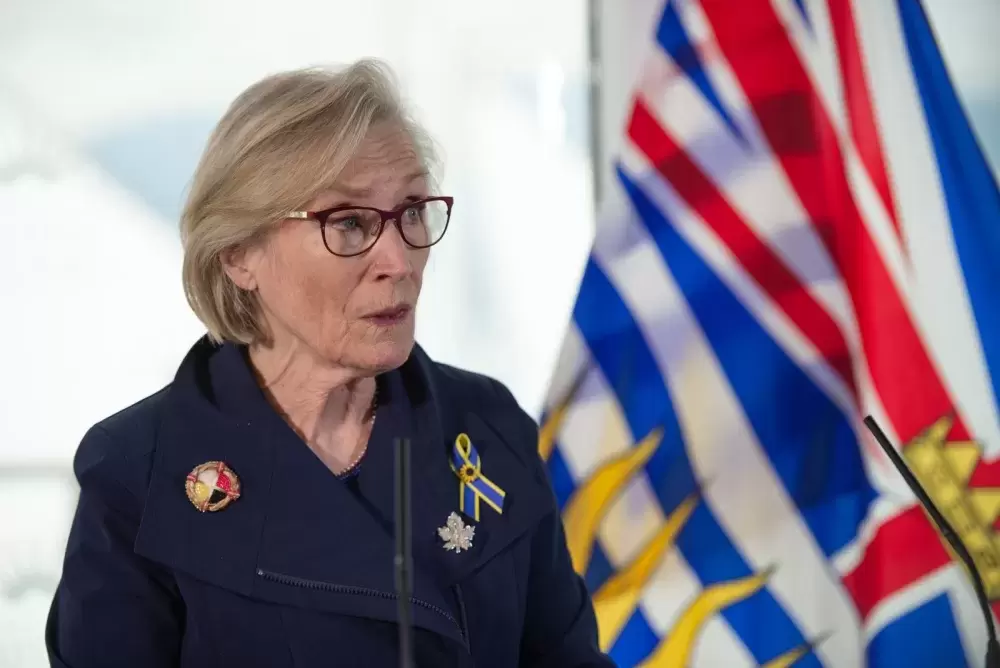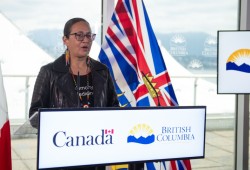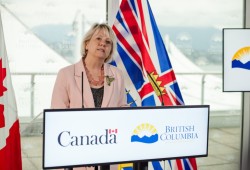Illicit drugs are now decriminalized in British Columbia, with a joint announcement issued today from the province and Health Canada affecting illegal substances carried for personal use.
After lobbying the feds to make an exception, Health Canada has granted B.C. an exemption under the Controlled Drugs and Substances Act, which takes effect Tuesday, Jan. 31 and will be in place for at least the next three years. As of Tuesday, anyone in the province 18 or older will not face criminal charges or seizure if found carrying up to 2.5 grams of opioids, cocaine methamphetamine or MDMA (ecstasy).
“Instead, police will offer information on available health and social supports, as well as local treatment and recovery options,” stated a government press release.
Officials noted that this is not the legalization of street drugs, and charges still apply if any amount is found on the property of an elementary, high school or daycare.
The federal government and the province have pledged to closely monitor how the ongoing opioid crisis progresses to ensure “desired outcomes of decriminalization are met and there are no unintended consequences,” continued the release.
“Supporting British Columbia in this exemption to the Controlled Drugs and Substances Act, our government is providing the province with the ability to help divert people away from the criminal justice system toward the health and social services they need,” said Carolyn Bennett, Canada’s minister of Mental Health and Addictions and the associate minister of Health.
Dr. Bonnie Henry, B.C.’s provincial health officer, hopes that allowing the personal possession amount will “open conversations” about drug use by ending the stigmatization that illicit users face.
“It drives people to hide their addictions and use alone,” she said.
The announcement is the province’s latest effort to curb a fatal toll that has climbed to almost six deaths a day from illicit drug use since the start of the COVID-19 pandemic. The opioid crisis was declared a public health emergency in April 2016, and in the following years the rate of fatal overdoses climbed to 1,562 across in B.C. in 2018.
Public health officials and front-line workers saw the situation improve the following year, when fatalities dropped to 987. But widespread public health restrictions to control the spread of COVID-19 in 2020 coincided with fatal overdoses rising to 1,775, then increasing again the next year to 2,306. The most recent data from the BC Coroners Service shows 2,272 deaths in 2022, although this number could climb after more toxicology results are verified.
Officials have blamed an increasingly toxic supply of street drugs for how the crisis escalated during the pandemic, as well as the growing tendency for people to use alone. Results from the Coroners Service show the presence of Fentanyl in fatal overdoses rising from five per cent in 2012 to 87 per cent in 2021. Etizolam, a drug medically used for insomnia and anxiety disorders, was detected in 38 per cent of illicit deaths from July 2020 to August 2022. This benzodiazepine analog doesn’t respond to naloxone treatment.
“We know that criminalization drives people to use alone. Given the increasingly toxic drug supply, using alone can be fatal,” said Jennifer Whiteside, B.C.’s minister of Mental Health and Addictions. “Decriminalizing people who use drugs breaks down the fear and shame associated with substance use and ensures they feel safer reaching out of live-saving supports.”
First Nations have died by illicit drug use at a rate of 4.8 times more than other B.C. residents, according to data from the First Nations Health Authority from the first half of 2021.
“This is because First Nations people experience stereotyping, racism and discrimination in many different ways, including the health care and judicial systems,” said Dr. Nel Wiemen, the FNHA’s acting chief medical officer. “Decriminalization will help to mitigate the stigma and shame attached to substance use and reduce the negative impacts of criminal charges, which is especially important to First Nations people who are over-represented in the criminal justice system.”
With the decriminalization announcement, the province noted it was building “a comprehensive and seamless system of mental health and addictions care that works for all British Columbians.” This includes hundreds of new treatment beds, improved access to supervised consumption sites and the growing prescription of a safer supply of drugs, including the administration of less harmful opioids than what is purchased on the street.
But for the many Nuu-chah-nulth families affected by the opioid crisis, this hasn’t been enough. Last spring the Nuu-chah-nulth Tribal Council called on governments and the FNHA to provide a seven-day-a-week “rapid access addiction clinic in Nuu-chah-nulth Hahoulthee (traditional territories) along with a fully certified detox centre that will work in a culturally safe and trauma informed way.”
The Alberni/Clayoquot health area, which covers a large portion of Nuu-chah-nulth territory, ranks fourth in the province for the rate of deaths by illicit drug use, with the highest toll on Vancouver Island, according to coroner’s data from January to August of last year.
“We are in a state of emergency with the number of deaths from drug overdoses with Nuu-chah-nulth people,” said NTC President Judith Sayers in a press release from April 1, 2022. “We need resources-money, services, and counselling and so much more. We can’t keep saying this is a crisis, an emergency if we haven’t taken drastic steps to prevent more deaths. The time to act is now, let’s act together to save lives.”
During Jan. 30 press conference the case of Portugal was mentioned several times, a country that decriminalized drug possession over 20 years ago. After facing an illicit drug epidemic in the 1990s and the European Union’s highest rate of HIV infection among injecting users, Portugal decriminalized the possession of illegal substances for personal use in July 2001. Over the following years the country saw drug-related incarcerations drop from 3,863 in 1999 to 1,140 in 2016, and HIV infection among users fell from 907 to 18 over the same time period. Meanwhile, Portugal’s overdose deaths fell from 369 in 1999 to 72 in 2019, dropping to as low as 10 fatalities in 2011.



